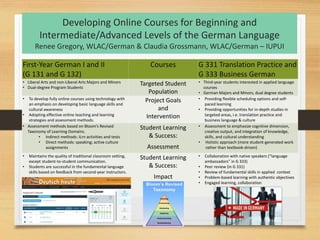CEG2015PosterFinal2
•Transferir como PPTX, PDF•
0 gostou•135 visualizações
Denunciar
Compartilhar
Denunciar
Compartilhar

Recomendados
Presentation at ISETL Conference in 20042004 ISETL Speak English? ¿Habla Español? A Bilingual Model in Higher Education 

2004 ISETL Speak English? ¿Habla Español? A Bilingual Model in Higher Education Carmen Lizy Lamboy-Naughton, Ed.D.
Council for Adult and Experiential Learning Chicago, 2005
2005 CAEL Speak English? Habla Espanol? A dual-language accelerated learning ...

2005 CAEL Speak English? Habla Espanol? A dual-language accelerated learning ...Carmen Lizy Lamboy-Naughton, Ed.D.
Adult Higher Education Alliance 25th National Conference Boston, 2005
2005 AHEA Speak English? ¿Habla Español? A Dual-Language Model for Higher E...

2005 AHEA Speak English? ¿Habla Español? A Dual-Language Model for Higher E...Carmen Lizy Lamboy-Naughton, Ed.D.
Recomendados
Presentation at ISETL Conference in 20042004 ISETL Speak English? ¿Habla Español? A Bilingual Model in Higher Education 

2004 ISETL Speak English? ¿Habla Español? A Bilingual Model in Higher Education Carmen Lizy Lamboy-Naughton, Ed.D.
Council for Adult and Experiential Learning Chicago, 2005
2005 CAEL Speak English? Habla Espanol? A dual-language accelerated learning ...

2005 CAEL Speak English? Habla Espanol? A dual-language accelerated learning ...Carmen Lizy Lamboy-Naughton, Ed.D.
Adult Higher Education Alliance 25th National Conference Boston, 2005
2005 AHEA Speak English? ¿Habla Español? A Dual-Language Model for Higher E...

2005 AHEA Speak English? ¿Habla Español? A Dual-Language Model for Higher E...Carmen Lizy Lamboy-Naughton, Ed.D.
American Association for Adult and Continuing Education Presentation at National Conference in 20052005 AAACE Speak English? ¿Habla Español? A Dual-Language Model for Higher ...

2005 AAACE Speak English? ¿Habla Español? A Dual-Language Model for Higher ...Carmen Lizy Lamboy-Naughton, Ed.D.
Regis Meeting held June 12, 2004
San Diego, California
2004 Speak English? ¿Habla Español? A Bilingual Model in Higher Education 

2004 Speak English? ¿Habla Español? A Bilingual Model in Higher Education Carmen Lizy Lamboy-Naughton, Ed.D.
Mais conteúdo relacionado
Semelhante a CEG2015PosterFinal2
American Association for Adult and Continuing Education Presentation at National Conference in 20052005 AAACE Speak English? ¿Habla Español? A Dual-Language Model for Higher ...

2005 AAACE Speak English? ¿Habla Español? A Dual-Language Model for Higher ...Carmen Lizy Lamboy-Naughton, Ed.D.
Regis Meeting held June 12, 2004
San Diego, California
2004 Speak English? ¿Habla Español? A Bilingual Model in Higher Education 

2004 Speak English? ¿Habla Español? A Bilingual Model in Higher Education Carmen Lizy Lamboy-Naughton, Ed.D.
Semelhante a CEG2015PosterFinal2 (20)
2005 AAACE Speak English? ¿Habla Español? A Dual-Language Model for Higher ...

2005 AAACE Speak English? ¿Habla Español? A Dual-Language Model for Higher ...
2004 Speak English? ¿Habla Español? A Bilingual Model in Higher Education 

2004 Speak English? ¿Habla Español? A Bilingual Model in Higher Education
Subject Didactics 2: English Language Teaching and Testing.pptx

Subject Didactics 2: English Language Teaching and Testing.pptx
Instructional Programs for English Language Learners (ELL)

Instructional Programs for English Language Learners (ELL)
Content-Focused Language Instruction - Akita/Iwate JALT

Content-Focused Language Instruction - Akita/Iwate JALT
English and Social Studies Department Presentation 2015 by Kru James parents ...

English and Social Studies Department Presentation 2015 by Kru James parents ...
CEG2015PosterFinal2
- 1. Developing Online Courses for Beginning and Intermediate/Advanced Levels of the German Language Renee Gregory, WLAC/German & Claudia Grossmann, WLAC/German – IUPUI First-Year German I and II (G 131 and G 132) Courses G 331 Translation Practice and G 333 Business German • Liberal Arts and non-Liberal Arts Majors and Minors • Dual-degree Program Students Targeted Student Population • Third-year students interested in applied language courses • German Majors and Minors, dual degree students • To develop fully online courses using technology with an emphasis on developing basic language skills and cultural awareness • Adopting effective online teaching and learning strategies and assessment methods. Project Goals and Intervention • Providing flexible scheduling options and self- paced learning • Providing opportunities for in-depth studies in targeted areas, i.e. translation practice and business language & culture • Assessment methods based on Bloom’s Revised Taxonomy of Learning Domains. • Indirect methods: iLrn activities and tests • Direct methods: speaking; active culture assignments Student Learning & Success: Assessment • Assessment to emphasize cognitive dimension, creative output, and integration of knowledge, skills, and cultural understanding • Holistic approach (more student-generated work rather than textbook-driven) • Maintains the quality of traditional classroom setting, except student-to-student communication. • Students are successful in the fundamental language skills based on feedback from second-year instructors. Student Learning & Success: Impact • Collaboration with native speakers (“language ambassadors” in G 333) • Peer review (in G 331) • Review of fundamental skills in applied context • Problem-based learning with authentic objectives • Engaged learning, collaboration